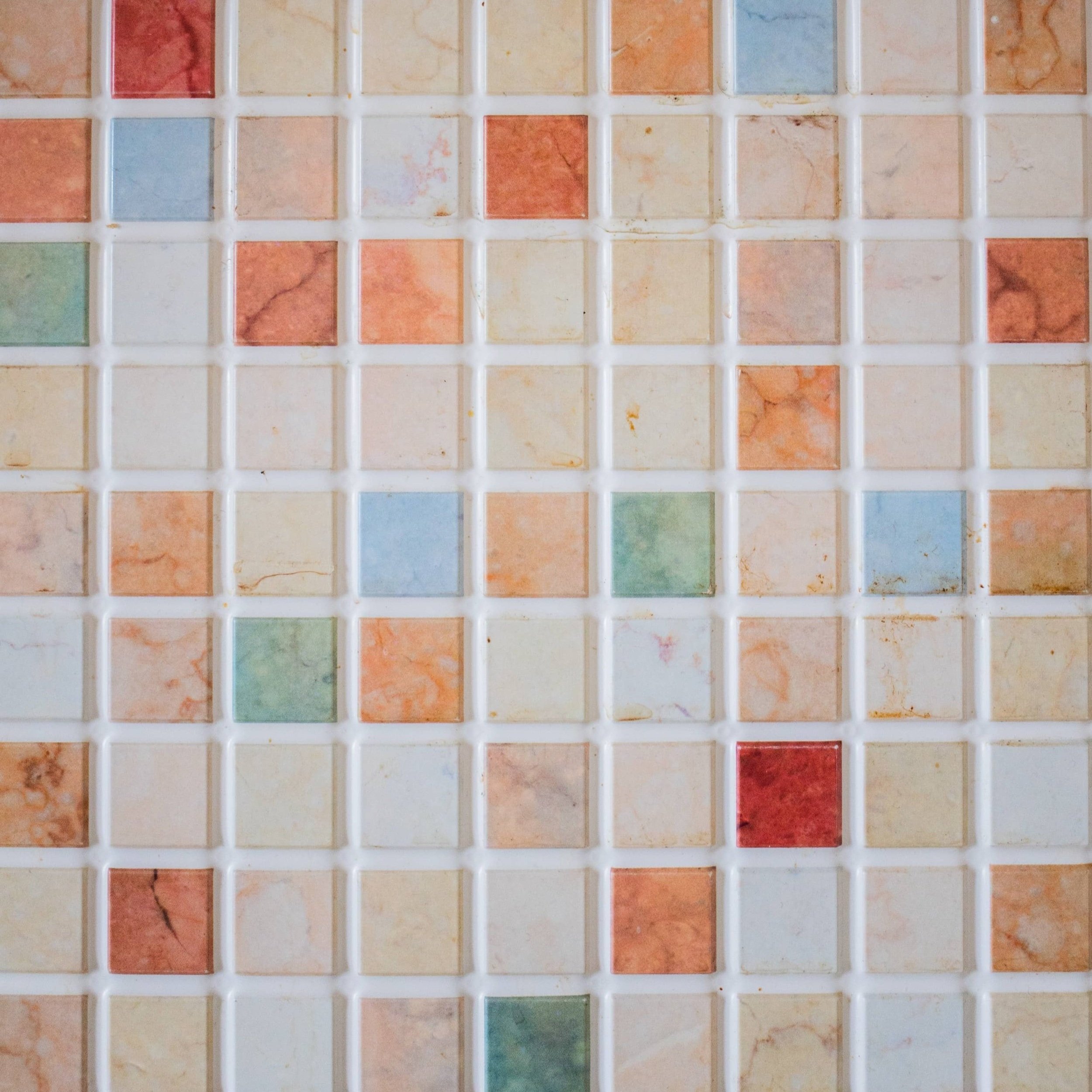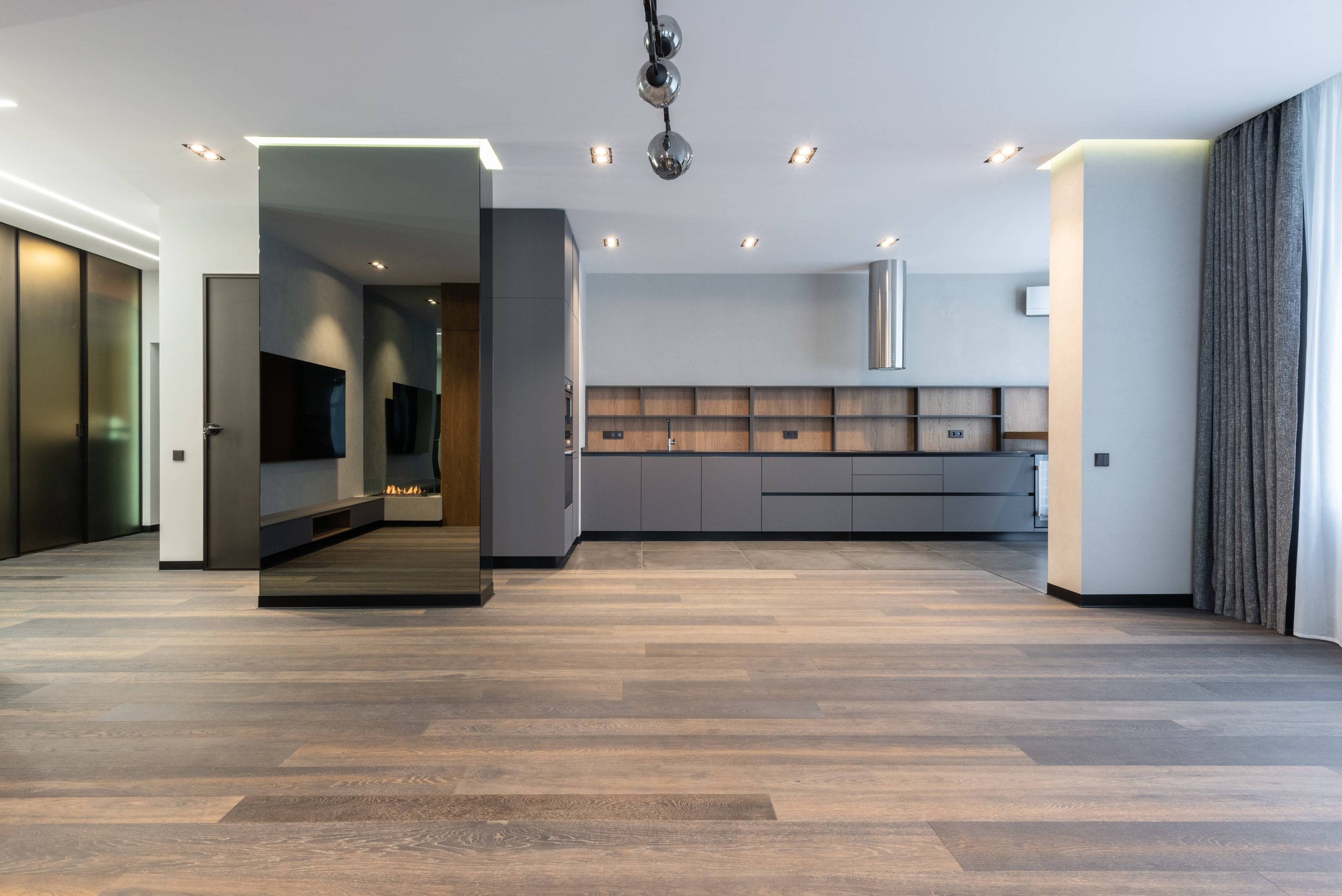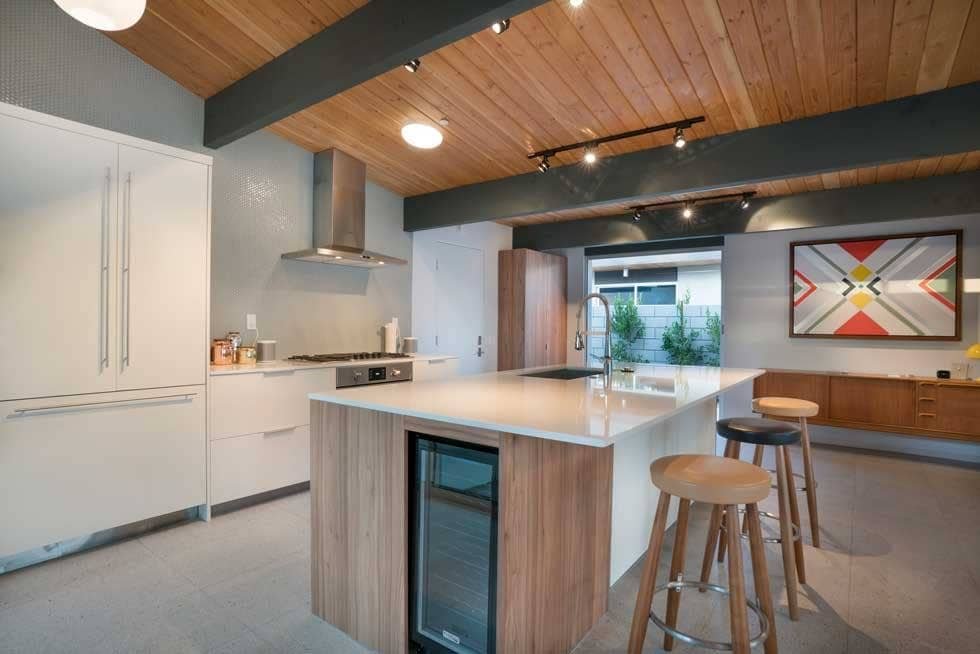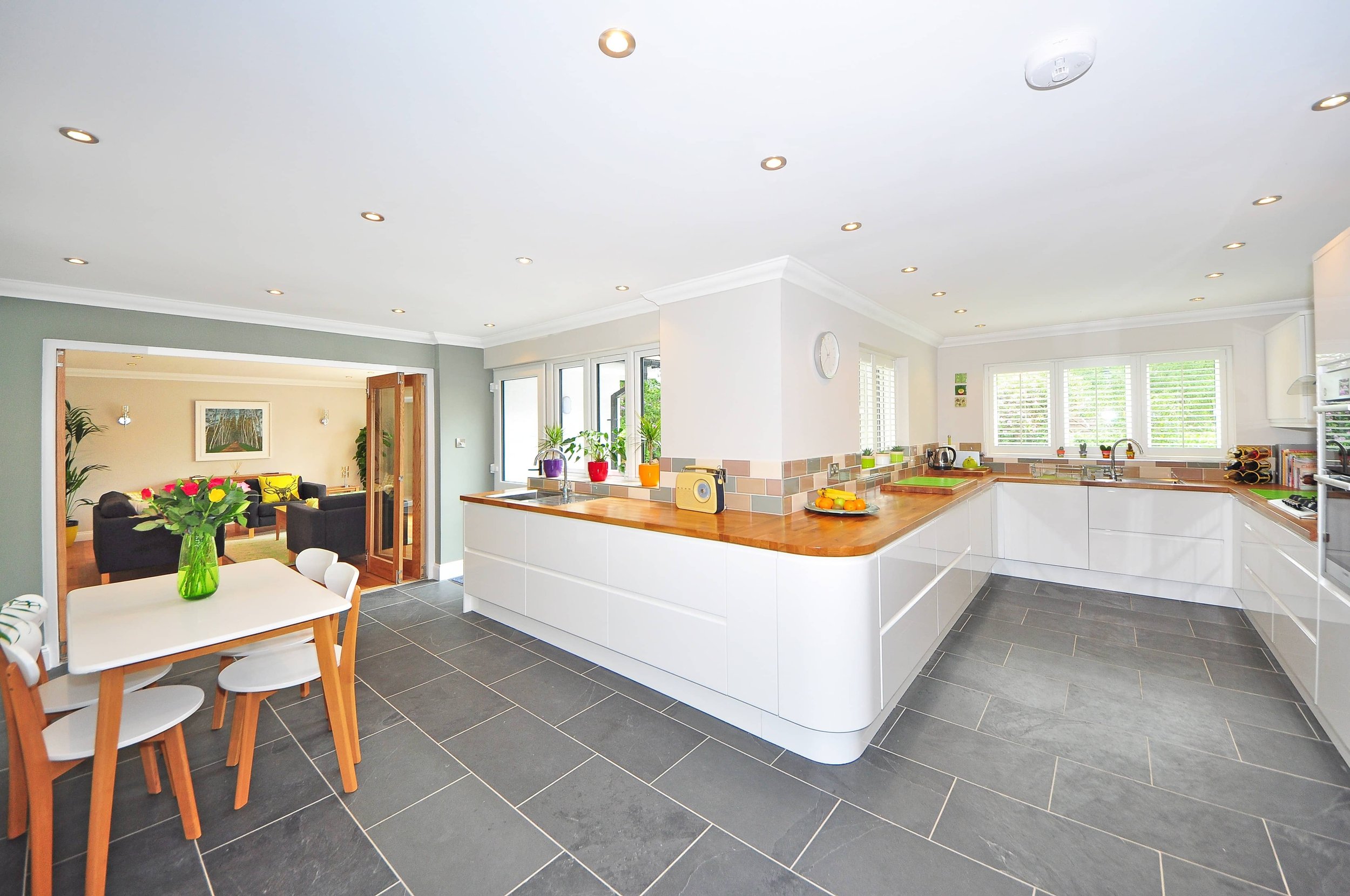The 14 Best Types of Kitchen Flooring: Durable Kitchen Flooring Options to Consider for your New Kitchen
When it comes to choosing the best flooring for the kitchen, there are many different options to choose from. Each type of flooring has its own unique set of pros and cons. In this article, we will discuss the best kitchen flooring types as well as the pros and cons of each different type of flooring.
If you're looking for the best kitchen flooring options, you've come to the right place. We'll discuss a variety of styles and flooring types, as well as which flooring is best for each home improvement project, from popular kitchen flooring options like vinyl, porcelain and ceramic tiles, and hardwood, to lesser known choices for kitchens such as terrazzo and cork. By the end of this article, you should have a better understanding of which type of flooring would be best for your own kitchen.
Designing a new kitchen? Check out these kitchen design and layout ideas!
Types of Kitchen Flooring and Floor Materials:
- Ceramic
- Porcelain
- Concrete
- Natural Stone
- Terra Cotta
- Hardwood
- Laminate
- Travertine
- Terrazzo
- Mosaic
- Cork
- Bamboo
- Vinyl
- Linoleum
Ceramic Flooring
Ceramic flooring is a type of flooring made from ceramic tiles. Ceramic tiles are made from a variety of materials, including clay, sand, and water The tiles are then fired in a kiln to high temperatures, which makes them hard and durable. Ceramic flooring is a popular choice for many homeowners because it is easy to care for and maintain.
Pros:
Ceramic floor tiles are easy to clean and maintain
Ceramic flooring is resistant to staining and spills
Ceramic flooring is durable and long-lasting
Ceramic flooring is available in a variety of colors and styles
Ceramic flooring is affordable
Cons:
Ceramic flooring can be cold to the touch
Ceramic flooring can be slippery when wet
Ceramic flooring is susceptible to chipping and cracking
Ceramic flooring requires regular sealing and polishing
Ceramic flooring is not as comfortable as other types of flooring
Porcelain Flooring
Porcelain flooring is a type of ceramic flooring that is made from porcelain tiles. Porcelain tiles are a type of ceramic tile that is made from a clay body that is fired at a high temperature. The high firing temperature makes the tile more durable and less absorbent than other types of ceramic tiles. Porcelain tiles are available in a variety of colors, sizes, and shapes.
Pros:
Porcelain is a very strong and durable material
It is easy to clean and maintain
Porcelain floors are resistant to stains and scratches
They are also water-resistant and slip resistant
Porcelain floors can add a touch of elegance to any kitchen
Cons:
Porcelain floors can be cold to the touch
They can be slippery when wet
They are also more expensive than other types of flooring, such as linoleum or vinyl
Installation can be difficult and time-consuming
Porcelain floors may need to be resealed or refinished on a regular basis to keep them looking their best
Concrete Flooring
Concrete flooring is a type of flooring that is made from concrete. It is a popular choice for many homes and businesses because it is durable and easy to maintain. Concrete flooring can be stained or painted to match any decor, and it is also resistant to mold and mildew.
Pros:
Concrete kitchen flooring is very durable
Concrete kitchen flooring is easy to clean
Concrete kitchen flooring is stain resistant
Concrete kitchen flooring is slip resistant
Concrete kitchen flooring is easy to maintain
Cons:
Concrete kitchen flooring can be cold and hard on the feet
Concrete kitchen flooring can be difficult to install
Concrete kitchen flooring can be difficult to repair if damaged
Concrete kitchen flooring can be susceptible to cracking over time
Concrete kitchen flooring can be slippery when wet
Natural Stone Flooring
Natural stone flooring is a type of flooring that is made from natural stone materials. The most common types of natural stone flooring include granite, marble, limestone, and slate. Natural stone flooring is durable and easy to maintain, making it a popular choice for both residential and commercial applications.
Pros:
Natural stone kitchen flooring is durable and long lasting
It is easy to clean and maintain
It is slip resistant and safe
It is a natural product that is eco-friendly
It adds value to your home
Cons:
Natural stone kitchen flooring can be expensive
It is difficult to install and repair
It can be cold and hard on your feet
It can be slippery when wet
It requires regular sealing and maintenance
Terra Cotta Flooring
Terra cotta flooring is a type of flooring made from fired clay. It is a popular choice for floors in both residential and commercial settings because of its durability and aesthetic appeal. Terra cotta flooring is available in a variety of colors and styles, making it a versatile option for any space. While it is typically more expensive than other types of flooring, terra cotta's long-lasting beauty and easy maintenance make it a wise investment.
Pros:
Terra cotta floors are unique and add character to a kitchen
The material is naturally heat-resistant, making it ideal for kitchens
Terra cotta floors are easy to clean and maintain
The material is also slip-resistant, making it safer for busy kitchens
Terra cotta floors are affordable and can last for many years with proper care
Cons:
Terra cotta floors can be cold and hard on feet, so they may not be comfortable for long periods of standing or cooking
The material is somewhat porous, so it can stain easily if not sealed properly or cleaned up quickly enough
Terra cotta floors can crack or chip easily if dropped or hit with heavy objects
The color of terra cotta floors may fade over time from exposure to sunlight
Terra cotta floors may require more frequent sweeping
Are you looking to refresh your kitchen with a remodel? We’ve got you covered with this article!
Hardwood Flooring
Hardwood flooring is a type of flooring that uses solid hardwood boards or planks to create a smooth, level surface. Hardwood floors are typically made from oak, maple, or cherry trees, but can also be made from other hardwoods like walnut or mahogany. Hardwood floors are typically more expensive than other types of flooring, like carpet or linoleum, but they can last for many years with proper care and maintenance.
Pros:
Hardwood floors are classic and elegant
They are easy to clean and maintain
Hardwood is a durable flooring option and lasts for many years
They add value to your home
Hardwood floors are eco-friendly and made from natural materials
Cons:
Hardwood floors are expensive
They can be scratched or dented easily
They require regular maintenance, such as sweeping, mopping, and polishing
They can be damaged by water or other liquids
Hardwood floors can be noisy when walking on them
Laminate Flooring
Laminate flooring is a synthetic product made to look like wood or stone. It is produced by bonding layers of materials together with heat and pressure. The top layer is a wear-resistant and water-resistant transparent film that protects the decorative layer below. Laminate flooring is easy to install and maintain, and it is an affordable alternative to hardwood or stone floors.
Pros:
Laminate kitchen flooring is easy to install
Laminate kitchen flooring is easy to clean and maintain
Laminate kitchen flooring is durable
Laminate kitchen flooring is available in a variety of colors and styles
Laminate kitchen flooring is cost-effective
Cons:
Laminate kitchen flooring can be damaged by water or excessive moisture
Laminate kitchen flooring can be scratched or scuffed
Laminate kitchen flooring may not be as comfortable as other types of flooring
Laminate kitchen flooring may not be as durable as other types of flooring
Laminate kitchen flooring may not be available in as many colors and styles as other types of flooring
Travertine Flooring
Travertine is a type of limestone that is formed by hot springs or other natural sources of heat and pressure. The stone is characterized by its porousness, softer texture, and its distinctive veining. Travertine flooring has become increasingly popular in recent years because of its durability and its aesthetic appeal. Travertine flooring is often used in high-end homes and commercial buildings because of its durability and elegant appearance.
Pros:
Travertine is a durable natural stone that can withstand heavy foot traffic
It is easy to clean and maintain with regular sweeping and mopping
Travertine floors add a touch of luxury to any kitchen and increase the resale value of the home
The stone is cool to the touch, making it comfortable to stand on for long periods of time
Travertine comes in a variety of colors and patterns, so it is easy to find one that fits your taste and kitchen décor
Cons:
Travertine floors can be expensive, especially if you opt for designer tiles
The stone is porous and can stain easily if not sealed properly or cleaned up promptly after spills occur
Sharp objects can scratch or chip travertine, so it may not be the best choice if you have young children in the home who are prone to dropping
Terrazzo Flooring
Terrazzo flooring is a type of flooring that consists of pieces of marble, glass, or other materials embedded in concrete. The word "terrazzo" comes from the Italian word for "terrace," which refers to the fact that this type of flooring was originally used on outdoor terraces. Terrazzo is very durable and easy to maintain, making it a popular choice for both commercial and residential applications.
Pro:
Terrazzo kitchen flooring is easy to clean and maintain
It is a durable material that can last for many years
Terrazzo is a hypoallergenic material, making it ideal for people with allergies or sensitivities
Terrazzo kitchen flooring is available in a variety of colors and designs
It is a relatively inexpensive flooring option
Con:
Terrazzo kitchen flooring can be slippery when wet
It is a hard surface, so it can be uncomfortable to stand on for long periods of time
Terrazzo floors can be difficult to install yourself
If not sealed properly, terrazzo floors can stain easily
Terrazzo floors can be scratched or chipped if they are not cared for properly
Cork Flooring
Cork flooring is a type of flooring made from cork. Cork is a natural wood material that is durable and comfortable to walk on. Cork flooring is available in a variety of colors and patterns, and can be installed over any type of subfloor. Cork flooring is easy to clean and maintain and is a great choice for high-traffic areas.
Pros:
Cork kitchen flooring is a very durable material
Cork is a natural insulator, so cork kitchen flooring can help to keep your kitchen cooler in the summer and warmer in the winter
Cork is a very soft material, so it is very comfortable to stand on for long periods of time
Cork kitchen flooring is very easy to clean and maintain
Cork floors are environmentally friendly because they are made from a renewable resource
Cons:
Cork kitchen flooring can be damaged by high heels or other sharp objects
Cork floors can be stained by spilled food or drinks
If cork floors get wet, they can swell up and become warped
Cork floors can be scratched by pets or other animals
Cork floors may fade in direct sunlight
Mosaic Flooring
Mosaic flooring is a type of tile flooring that consists of small pieces of stone tiles or glass tiles that are arranged in a pattern. Mosaic flooring is often used in areas where there is a lot of foot traffic, such as entryways and kitchens. Mosaic flooring is easy to clean and maintain, and it can last for many years.
Pros:
Mosaic kitchen floor tiles can be very beautiful and unique
It can be easy to clean if the tiles are sealed properly
Mosaic flooring can be slip resistant
It is usually durable and long lasting
Mosaic kitchen flooring can add value to your home
Cons:
Mosaic kitchen flooring can be expensive
The grout between the tiles can be difficult to clean and may need to be replaced over time
Mosaic kitchen flooring can be cold and hard underfoot
If the tiles are not sealed properly, they can absorb spills and stains
Mosaic kitchen flooring may crack or break if it is not installed correctly
Bamboo Flooring
Bamboo flooring is a type of flooring made from the bamboo plant. Bamboo is a grass that is native to Asia and grows quickly, making it a sustainable resource. Bamboo flooring is harder than many types of wood flooring and is resistant to moisture and pests. Bamboo flooring can be installed over concrete or wood subfloors and comes in a variety of colors and styles.
Pros:
Bamboo floors are elegant and stylish
They are very durable and can withstand heavy traffic
Bamboo floors are easy to care for and require little maintenance
They are environmentally friendly and sustainable
Bamboo floors are relatively inexpensive compared to other flooring options
Cons:
Bamboo floors can be scratched or dented easily
They are not as heat resistant as other flooring materials and can warp in extreme temperatures
Bamboo floors can be susceptible to water damage if they are not properly sealed or maintained
Some people find the appearance of bamboo floors to be too rustic
Bamboo is an eco-friendly material, and we’ve previously written all about designing sustainable kitchens!
Vinyl Flooring
Vinyl flooring is a synthetic material made from polyvinyl chloride (PVC), which is a type of plastic. It has a number of advantages over other types of flooring, including being more durable, easier to clean, and more resistant to water damage. Vinyl flooring is available in a variety of colors and patterns, making it a popular choice for both home and commercial settings.
Pros:
Vinyl is a very affordable flooring option
Vinyl is easy to install and can be a do-it-yourself project
Vinyl is easy to clean and maintain
Vinyl is waterproof and durable
Vinyl comes in a variety of colors and styles
Cons:
Vinyl may not be as durable as some other flooring options
Vinyl can be damaged by sharp objects or excessive heat
Vinyl may fade or discolor over time
Vinyl may not be eco-friendly or sustainable
Some people believe vinyl has an artificial look and feel
Linoleum Flooring
Linoleum flooring is a popular choice for many homes and businesses due to its durability and easy maintenance. Linoleum is made from natural materials including linseed oil, wood flour, cork dust, and limestone, which makes it a sustainable and eco-friendly flooring option. Linoleum is available in a variety of colors and patterns, making it a versatile flooring choice for any space.
Pros:
Linoleum is a natural material made from cork, linseed oil, wood flour, and limestone
It is durable and easy to clean
It is slip-resistant and has a low environmental impact
It is available in a variety of colors and patterns
It is an affordable option for kitchen flooring
Cons:
Linoleum can be damaged by sharp objects or excessive heat
It may fade over time if exposed to direct sunlight
It can be difficult to install for DIYers
Some people find it difficult to clean or maintain
It may not be as stylish as some other types of flooring









